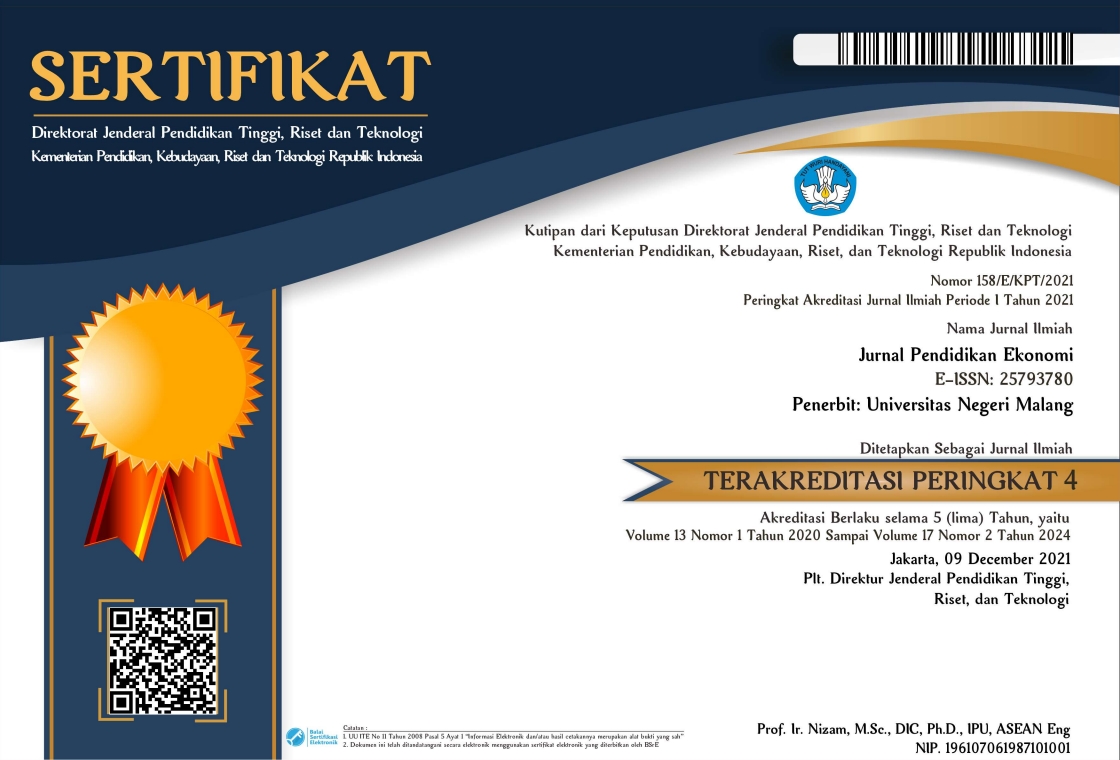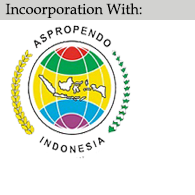Using Andragogy Approach to Transfer Pancasila Values in Economic Learning
Abstract
According to an increasing number of business practices that tend to apply the economic system of capitalism, transferring Pancasila values in economic learning for the novice entrepreneur is quite essential to do. The amount of business competition everywhere erodes the values of togetherness and brotherhood that characterize the nation's culture. The Association of Micro Small and Medium Enterprises (MSME) in Indonesia is a supporting pillar in the learning of Micro Small and Medium Enterprises (MSME) that still prioritize the basis of Pancasila economy values such as cooperation, kinship, and mutual assistance. Thus, this review of literature aims to examine the educational approach that can transfer the values to adult students; that is andragogy. The discussion part mainly addresses the values of Pancasila, the economic learning through andragogy approach, and the characteristics of adult students. This review paper concludes that Andragogy approach can be effective to facilitate the process of transferring the values of Pancasila in the Micro Small and Medium Enterprises (MSME) in Indonesia.
Keywords
Full Text:
PDFReferences
Abbott, B. (1995) Training strategies in small service sector firms: employer and employee perspectives. Human Resource Management Journal, 4(2), 70-87.
Anderson, V., & Boocock, G. (2002). Small firms and internationalization: Learning to manage and managing to learn. Human Resource Management Journal, 12, 5-24.
Atherton, J. S. (2003) Learning and teaching: Knowles’ andragogy. Retrieved from http://www.dme.ac.uk/~jamesa/learning/knowlesa.htm
Blondy, L. C. (2007) Evaluation and application of andragogical assumptions to the adult online learning environment. Journal of Interactive Online Learning, 6(2), 116-130.
Bruner, J. (1966) Toward a theory of instruction. Cambridge, MA: Belknap Press of Harvard University Press.
Friere, P. (1993) Pedagogy of the oppressed. New York: Continuum.
Gibb, A. A. (1997) Small firms’ training and competitiveness: Building upon small business as a learning organization. International Small Business Journal, 15(3), 13-29.
Gunawan, I. (2016) Perspectives of Pancasila: Leadership education’s values and ethics. Proceedings of 2nd International Conference on Education and Training.
Hatta, M. (2014) Demokrasi kita (Pikiran-pikiran tentang demokrasi dan kedaulatan rakyat). Bandung: Sega Arsy.
Indriani, D. E. (2017) Character education based on Pancasila values through Curriculum 2013 on primary education children in Madura. Jurnal Pendidikan Dasar Indonesia, 2, 13 – 17.
Ismail, M., Santosa, D. B., & Yustika, A. E. (2014) Sistem ekonomi Indonesia (Tafsiran Pancasila dan UUD 1945). Erlangga: Jakarta.
Keskin, H. (2006) Market orientation, learning orientation, and innovation capabilities in SMEs: An extended model. European Journal of Innovation Management, 9(4), 396-417.
Knowles, M. S. (1980) The modern practice of adult education: From pedagogy to andragogy. Chicago: Follett.
Knowles, M. S. (1984). Andragogy in action. San Francisco: Jossey-Bass.
Koentjaraningrat. (1961) Some social anthropological observations on gotong royong practices in two villages of Central Java. Ithaca, N.Y.: Cornell University, Modern Indonesia Project.
Kurniawan, M. I. (2017) Pancasila as a basis for nation’s character education. Advances in Social Science, Education, and Humanities Research (ASSEHR), 125.
Lindeman, E. (1926). The meaning of adult education. Montreal: Harvest House.
Martoredjo, N. T. (2016) Building character through Pancasila values to sovereign nation. Humaniora, 7(1), 116-121.
Mubyarto. (1988). Sistem dan moral ekonomi Indonesia. Jakarta: LP3ES.
Mubyarto. (1990). Ekonomi Pancasila gagasan dan kemungkinan. Jakarta: LP3ES.
Nielsen, A. C. (2005) Asia Pacific retail and shopper trends 2005 [online] http://www.acnielsen.de/pubs/documents/RetailandShopperTrendsAsia 2005.pdf [27 November 2006].
Oikawa, T. (2014) SMEs And Innovation : Lesson From Cooperative Relationships Between SMEs And Large Firms In Ireland And Asia Japan And Other Asian Countries, 338–351.
Rahardjo, I. T. K., & Herdianto, W. K. (2001) Lahirnya Pancasila dalam Bung Karno dan tatanan dunia baru. Jakarta: Grasindo.
Rogers, C. (1967) The interpersonal relationship in the facilitation of learning. In H. Kirschenbaum, & V. L. Henderson (Eds.), The Carl Rogers reader (pp. 304-322). London: Constable.
Swasono, S-E. (2011) Pancasila, humanisme, pasal 33 UUD 1945, kooperativisme, menolak liberalism. A scientific lecture, Universitas Pasundan Bandung, Indonesia.
Tahir, M. I. T. (2015) The implementation of Pancasila economic system in economic learning at faculty of economics State University of Makassar. IOSR Journal of Economics and Finance, 6(6), 66-69.
Tennant, M., & Pogson, P. (1995) Learning and change in the adult years. A developmental perspective. San Francisco: Jossey-Bass.
Undang-Undang Dasar 1945
Vickerstaff, S. (1990) The training needs of small firms. Human Resource Management Journal, 2(3), 1-15.
Refbacks
- There are currently no refbacks.

Jurnal Penddidikan Ekonomi is licensed under a Creative Commons Attribution-NonCommercial-ShareAlike 4.0 International License





